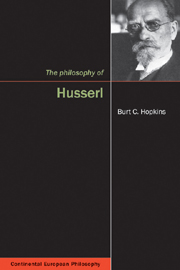Book contents
- Frontmatter
- Contents
- Acknowledgements
- Abbreviations
- Prolegomenon: Husserl's turn to history and pure phenomenology
- I Plato's and Aristotle's theory of eidē
- 1 Plato's Socratic theory of eidē : the first pillar of the ancient precedent to pure phenomenology
- 2 Plato's arithmological theory of eidē : the second pillar of the ancient precedent to pure phenomenology
- 3 Aristotle's criticism of Plato's theory of eidē : the third (and final) pillar of the ancient precedent to pure phenomenology
- II From descriptive psychology to transcendentally pure phenomenology
- III From the phenomenology of transcendental consciousness to that of monadological intersubjectivity
- IV From monadological intersubjectivity to the historical a priori constitutive of all meaning
- V The unwarranted historical presuppositions guiding the fundamental ontological and deconstructive criticisms of transcendental philosophy
- Epilogue: Transcendental-phenomenological criticism of the criticism of phenomenological cognition
- Coda: Phenomenological self-responsibility and the singularity of transcendental philosophy
- Notes
- Bibliography
- Index
1 - Plato's Socratic theory of eidē : the first pillar of the ancient precedent to pure phenomenology
from I - Plato's and Aristotle's theory of eidē
- Frontmatter
- Contents
- Acknowledgements
- Abbreviations
- Prolegomenon: Husserl's turn to history and pure phenomenology
- I Plato's and Aristotle's theory of eidē
- 1 Plato's Socratic theory of eidē : the first pillar of the ancient precedent to pure phenomenology
- 2 Plato's arithmological theory of eidē : the second pillar of the ancient precedent to pure phenomenology
- 3 Aristotle's criticism of Plato's theory of eidē : the third (and final) pillar of the ancient precedent to pure phenomenology
- II From descriptive psychology to transcendentally pure phenomenology
- III From the phenomenology of transcendental consciousness to that of monadological intersubjectivity
- IV From monadological intersubjectivity to the historical a priori constitutive of all meaning
- V The unwarranted historical presuppositions guiding the fundamental ontological and deconstructive criticisms of transcendental philosophy
- Epilogue: Transcendental-phenomenological criticism of the criticism of phenomenological cognition
- Coda: Phenomenological self-responsibility and the singularity of transcendental philosophy
- Notes
- Bibliography
- Index
Summary
Impossibility of direct knowledge of eidē
A precise exposition of Plato's account of the eidē requires that its dialogical mode of presentation be respected and therefore its origin in logos be acknowledged. Respecting the former yields the extremely important discovery of two discernibly different accounts of the eidē in the dialogues, accounts that nevertheless compose a unified whole. Acknowledging the latter reveals a whole that is unified neither theoretically nor practically, but in a manner that then, as now, can only be termed “dialectically”, through (dia) logos.
Plato's first, and most obvious, account of the eidē is discernible in the Socratic elenchi (refutations) of interlocutors who claim to know some commonly acknowledged standard of virtue (aretē), such as piety, justice, wisdom, courage, or even virtue itself, or the criteria responsible for something they claim to know about, such as education, love, the soul's nature, or even knowledge itself. In this account the ignorance of the non-philosopher, such as Euthyphro, Meno and Meletus, is manifest in his claim to know what he in truth does not know, and the wisdom of the philosopher Socrates is manifest in his refusal to claim that he knows what he in truth does not. Likewise made manifest is the irony of the philosopher Socrates' wisdom, because what he claims not to know are the eidē that no mortal is capable of knowing directly: that is, through perception or thought (dianoia).
- Type
- Chapter
- Information
- The Philosophy of Husserl , pp. 21 - 33Publisher: Acumen PublishingPrint publication year: 2010

